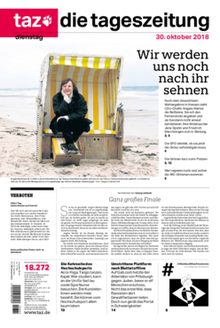 | |
 The 30 October 2018 front page of Die Tageszeitung | |
| Type | Daily newspaper |
|---|---|
| Format | Berliner |
| Publisher | taz, die tageszeitung Verlagsgenossenschaft eG |
| Editor | Barbara Junge, Ulrike Winkelmann |
| Founded | 1978 |
| Political alignment | New left, green left, new social movements, anti-capitalism, feminism, left-wing[1] |
| Language | German |
| Headquarters | Berlin |
| ISSN | 0931-9085 |
| Website | taz.de |
Die Tageszeitung (German: [diː ˈtaːɡəsˌtsaɪtʊŋ], "The Daily Newspaper"), stylized as die tageszeitung and commonly referred to as taz, is a German daily newspaper. It is run as a cooperative – it is administered by its employees and a co-operative of shareholders who invest in a free independent press, rather than to depend on advertising and paywalls.[2]
Founded in 1978 in Berlin as part of an independent, progressive and politically left-leaning movement, it has focused on current politics, social issues such as inequality, ecological crises both local and international, and other topics not covered by the more traditional and conservative newspapers. It mostly supports the alternative green political sphere and the German Green Party, but Die Tageszeitung has also been critical of the SPD/Greens coalition government (1998–2005).[3] It is one of Germany's most important newspapers and amongst the top seven.[4] It was for a long time described as "alternative-left" and critical of existing current structures (systemkritisch) but became more moderate liberal under the editors in-chief up from 2010.[5][6]
The newspaper's logo, a paw print, derives from the similarity of the name "taz" to a German word for paw, Tatze. Its position in the media landscape varies between the fifth and the sixth most read newspaper of Germany. In 2021 taz overtook for the first time the conservative Die Welt as the fifth most read daily newspaper of Germany.[7]
At the general meeting of the taz publishing cooperative in 2024, the management announced that the daily newspaper will publish its last paper print on 17 October 2025. After that it will only appear online; the columnistic weekend edition will remain in print.[8]
Barbara Junge and Ulrike Winkelmann are editors-in-chief; vice-editor-inchief is Katrin Gottschalk, chief reporter Peter Unfried.
- ^ Ross Beveridge, ed. (2011). A Politics of Inevitability: The Privatisation of the Berlin Water Company, the Global City Discourse and Governance in 1990s Berlin. Springer Science & Business Media. p. 143. ISBN 9783531940564. Archived from the original on 6 August 2022. Retrieved 31 December 2021.
Fitch's search of the left-wing newspaper Die Tageszeitung as well as the centre-right Die Welt revealed no articles ...
- ^ Patrick, Kingsley (1 October 2012). "The newspaper saved by its readers". The Guardian. Archived from the original on 24 July 2022. Retrieved 6 August 2022.
- ^ Brown, Kate; Richter, Christoph (c. 2019). "The anti-press". DW-Learn German. Archived from the original on 6 August 2022. Retrieved 6 August 2022.
- ^ "CULTURE & THE MEDIA: Newspapers and magazines". Facts about Germany. Fazit Communication GmbH, Frankfurt/Main, in cooperation with the Federal Foreign Office, Berlin. Archived from the original on 7 April 2022. Retrieved 6 August 2022.
{{cite web}}: CS1 maint: others (link) - ^ "IFM Mediendatenbank". 4 May 2012. Archived from the original on 3 January 2022. Retrieved 6 August 2022.
- ^ "Zeitungen in Deutschland". deutschland.de. 14 August 2012. Archived from the original on 25 September 2020. Retrieved 6 August 2022.
- ^ Schröder, Hens (21 January 2021). "Zeitungs-Auflagen: "Zeit" wächst massiv mit Print und Digital, "taz" überholt "Welt"". Meedia. Archived from the original on 8 March 2022. Retrieved 6 August 2022.
- ^ "taz-Genossen stimmen „Seitenwende" zu: Bloß nicht in Schönheit sterben". Die Tageszeitung: taz (in German). 14 September 2024. ISSN 0931-9085. Retrieved 16 September 2024.